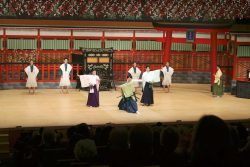AI Cannot Be ‘Inventor’ of Creative Works, Says Govt’s Draft IP Plan; Approach to AI Use of Actors’ Voices to Be Reviewed

Figurines with computers and smartphones are seen in front of the words “Artificial Intelligence AI” in this illustration taken on Feb. 19, 2024.
1:00 JST, May 25, 2024
Even if AI is used in a creative work, a human being must be the “inventor” of the work, according to a draft of the government’s “Intellectual Property Promotion Plan 2024,” it has been learned.
The draft will be finalized soon by the government’s Intellectual Property Strategy Headquarters, which is chaired by Prime Minister Fumio Kishida.
As to the voices of actors and voice actors, which are not protected under the current Unfair Competition Prevention Law, the draft also states that the principles on intellectual properties of such voices will be rethought.
The draft notes that at the current level of AI, “it is not possible to confirm that the AI itself is engaged in creative activities autonomously and apart from human involvement.” It adds that “a natural person should be recognized as the inventor.”
Similar opinions have been expressed in the judicial field as well. The Tokyo District Court dismissed on May 16 a lawsuit filed against the government by an American engineer, who claimed that the Japan Patent Office illegally rejected their patent application that named AI as the inventor. The court made its dismissal on the grounds that “‘inventor’ as defined by the Patent Law is limited to natural persons.”
The draft does, however, anticipate a rapid development of AI that would allow it to complete the novel parts of an invention by itself. “We will continue to examine [protections], taking into account technological progress, international trends and needs,” it states.
Generative AI has also been used to imitate the voices of some actors and voice actors, which were then circulated on social media. The draft states that the “mindset” for how to handle generative AI using and generating the voices of actors and voice actors “will be reviewed.”
As for copyrights, the draft only states that “awareness will be raised” about the “mindset” of the Copyright Law to clarify interpretations of the law, which was released in March by a subcommittee of the Cultural Affairs Council under the Cultural Affairs Agency. The draft does not touch on revisions to the Copyright Law.
And as for measures against the illegal distribution of anime online, the draft stresses the need to “promote the strengthening of strict border controls,” and includes a policy on promoting international cooperation in investigations. Given the need for the government to be actively involved in shaping international rules as new international markets emerge through tech development, the draft also suggests formulating a “national standards strategy” and developing a system to promote this strategy.
Top Articles in Society
-

Producer Behind Pop Group XG Arrested for Cocaine Possession
-

Man Infected with Measles Reportedly Dined at Restaurant in Tokyo Station
-

Man Infected with Measles May Have Come in Contact with Many People in Tokyo, Went to Store, Restaurant Around When Symptoms Emerged
-

Woman with Measles Visited Hospital in Tokyo Multiple Times Before Being Diagnosed with Disease
-

Australian Woman Dies After Mishap on Ski Lift in Nagano Prefecture
JN ACCESS RANKING
-

Producer Behind Pop Group XG Arrested for Cocaine Possession
-

Japan PM Takaichi’s Cabinet Resigns en Masse
-

Man Infected with Measles Reportedly Dined at Restaurant in Tokyo Station
-

Israeli Ambassador to Japan Speaks about Japan’s Role in the Reconstruction of Gaza
-

Videos Plagiarized, Reposted with False Subtitles Claiming ‘Ryukyu Belongs to China’; Anti-China False Information Also Posted in Japan






















